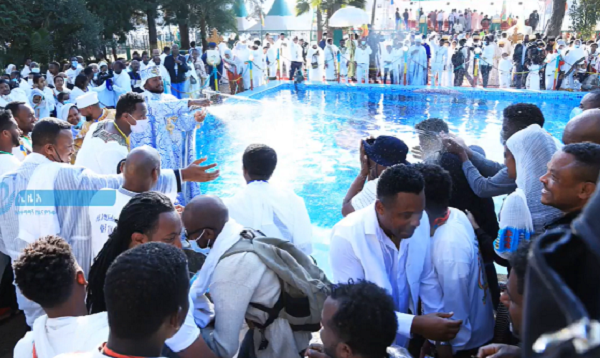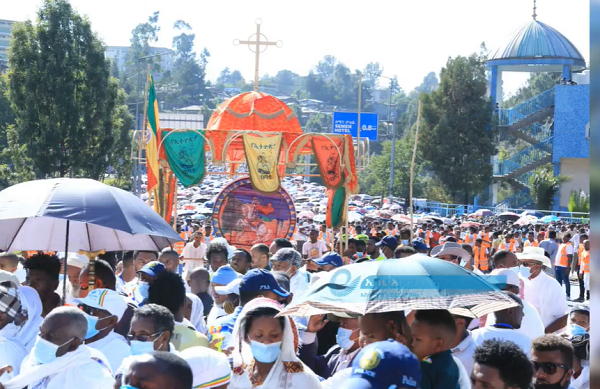Timket Festival: An Aspiration to Inspire the Future - ENA English
Timket Festival: An Aspiration to Inspire the Future

Addis Ababa January 19/2021( ENA) Today is the Orthodox Christians holiday of Timket (Ethiopian Epiphany), celebrated for centuries in Ethiopia.
The annual Timket festival is a celebration of epiphany among an orthodox Christian which commemorates the baptism of Jesus in the Jordan River.
It is largely considered as one of Ethiopia's highly rated public events, is a three-day affair involving distinctive religious and cultural activities.
The religious leaders sanctify the youths for their day and night strives that remains at least for a week to make the celebration colorful and real.
As part of the occasion, various types of traditional foods and drinks are prepared at home to celebrate the holiday.
The festival is celebrated publicly with cultural wears and songs beyond its religious commemoration and beating of drums, ringing of bells, and other spiritual activities are also deep elements of the Timket celebrations.
Since Timket is celebrated right after the harvest (sunny) season, on 19th day of January every year, a large number of people can participate on the occasion and be able to reflect diverse ceremonial traditions such as dressing styles, songs, dances, games, and competition among others.
The best place to be during Timket experience is Addis Ababa, Gonder and Axum where the festival is particularly spectacular.
The streets are adorned with green, red and yellow to represent the Ethiopian flag and priests walk through the streets holding colorful and richly decorated umbrellas.
Aside from the religious aspect of the Ethiopian Timket Festival, the event also has social features that create several opportunities especially a cultural dating day for young people who are trying to choose their spouses.
One of the major podiums of the Timket festivals is to inspire young boys and girls, of course leftovers, to have a chance to be acquainted with their future spouse. So, Timket festival is a kind of platform for young people that can aspire to inspire their great future ahead of them.
The disapprovals over their unwed status and the pressure on them to get married are so intense that some of these “leftover women”-the name for women not married by their late 20s-are searching for ways to avoid this family badgering.
This is done in a special ceremony where young men throw small-sized lemon on the chest of the young girls as an indication of their future partner. But lemon-throwing is increasingly out of fashion in major cities while it is still common in rural areas.
Moreover, Timket is considered a period of spiritual reconciliation amongst members of the society who previously had differences.
It take place over three days while the most important day is the 19th of January and this is when the blessing of water and reaffirming of baptism vows to take place.

The commemoration starts on the eve of the main festival on 18th January known as Ketera, which means blocking the flow of water for the blessing of the celebrants.
On the eve of Ketera, people escort their parish church tabot (replicas of the Ark of the Covenant) to Timkete-Bahir (a pool, river or artificial reservoir), transported by a priest of the parish and accompanied by a great ceremony.
Tabots are kept in a tent while the priests hold a vigil through the night lighting candles and oil lamps. Most followers do not go home and they spend the night praying, singing and dancing.
Hundreds of thousands participate in the actual festival on the following day 19 January where the celebration starts early in the morning with pre-sunrise ritual
These are followed by the sprinkling of the blessed water on the congregation who are waiting eagerly redemption of their sins and other ceremonies.
At around 10 a.m., each tabot begins its procession back to its respective church, involving an even more colorful ceremony with various traditional and religious songs by Sunday schools and other participants.
By afternoon, all the Tabots (except the Tabot from St. Michael’s Church), are returned to their respective churches in procession with crowds singing spiritual songs.
Ethiopian epiphany is amongst the well- known and colorful street religious celebrations of the Ethiopian Orthodox church along with their spectacular religious rituals that catch the eye of thousands of tourists.
Since Timket has been registered under Ethiopia’s world intangible cultural heritages following the inscription of Meskel, the Geda System, Fichee-chambalalla, the New Year festival of the Sidama people, it would play significant contribution to attract many tourists from around the world.
Therefore, spending time in Ethiopia is an excellent way for tourists to get an insight into the religion, culture and traditions in the country and they can plan to trip to Ethiopia and uncover how the epiphany exalted and commemorated.
Epiphany or Timket is one of the biggest outdoor religious festivals, which have enormous impact in strengthening unity and harmony in Ethiopia which is home to more than 80 ethnic groups.